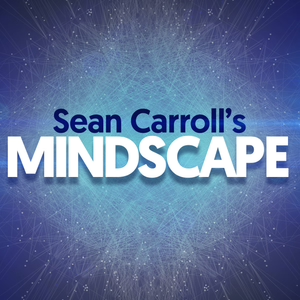
Ann-Sophie Barwich on the Surprising Neuroscience of Smell
12/20/20 • 49 min
Vision is the best understood sensory domain. But smell is turning out to be wonderfully strange and even more complex than sight.
Dr Ann-Sophie Barwich joins me to explore ideas from her recent book Smellosophy. How is vomit related to parmesan cheese? Why do things smell so different depending on context? And what does smell teach us about the very nature of perception?
We explore:
- Why the ‘promiscuity’ of smell doesn’t make it merely subjective. Smells can have a multitude of qualities or notes depending on the context and depending on the individual. But this variability has a functional basis.
- The weird neural representation of smell. The patterns of neural activation underpinning smell don’t follow the mapping principles followed by other sensory modalities.
- Why philosophers shouldn’t ignore the neural ‘plumbing’ of sensory systems. Evolved brain mechanisms underly the nature and function of the perceptual experience - so they have to inform a philosophical account of perception.
Check out Dr Barwich’s book Smellosophy here, https://www.hup.harvard.edu/catalog.php?isbn=9780674983694,
her article in Aeon magazine here https://aeon.co/essays/why-might-it-be-easier-to-fool-your-eyes-than-your-nose.
and another great piece in Nautilus http://nautil.us/issue/91/the-amazing-brain/our-mind_boggling-sense-of-smell
***
To get in touch with Ilan or join the conversation, you can find NOUS on Twitter @NSthepodcast or on email at [email protected]
Vision is the best understood sensory domain. But smell is turning out to be wonderfully strange and even more complex than sight.
Dr Ann-Sophie Barwich joins me to explore ideas from her recent book Smellosophy. How is vomit related to parmesan cheese? Why do things smell so different depending on context? And what does smell teach us about the very nature of perception?
We explore:
- Why the ‘promiscuity’ of smell doesn’t make it merely subjective. Smells can have a multitude of qualities or notes depending on the context and depending on the individual. But this variability has a functional basis.
- The weird neural representation of smell. The patterns of neural activation underpinning smell don’t follow the mapping principles followed by other sensory modalities.
- Why philosophers shouldn’t ignore the neural ‘plumbing’ of sensory systems. Evolved brain mechanisms underly the nature and function of the perceptual experience - so they have to inform a philosophical account of perception.
Check out Dr Barwich’s book Smellosophy here, https://www.hup.harvard.edu/catalog.php?isbn=9780674983694,
her article in Aeon magazine here https://aeon.co/essays/why-might-it-be-easier-to-fool-your-eyes-than-your-nose.
and another great piece in Nautilus http://nautil.us/issue/91/the-amazing-brain/our-mind_boggling-sense-of-smell
***
To get in touch with Ilan or join the conversation, you can find NOUS on Twitter @NSthepodcast or on email at [email protected]
Previous Episode

Matthew Cobb - Why Neuroscience Still Can’t Explain Much
Despite multi-million dollar research programmes and impressive technical progress, neuroscience still can’t explain basic systems - like a maggot’s tiny brain or the grinding of a lobster’s stomach.
Professor Matthew Cobb joins me to discuss the intellectual history of neuroscience, his frank assessment of where we’re at, and how we can make progress.
We cover:
- How the idea of the brain as computer got started in the mid-C20th, and why it’s probably wrong. (10:53)
- The challenge of the Grandmother Cell - and why some neurons selectively respond to Jennifer Aniston and Halle Berry! (21:00)
- What have we really learnt from fMRI? Is it “just a bit crap”? (27:25)
- Why the Human Brain Project was so controversial - and how its has spectacularly failed to live up to its own rhetoric (36:29).
- Could a neuroscientists understand a microprocessor? We discuss the brilliant study by Eric Jonas and Konrad Paul Kording. (41:30)
- The amazing achievement of artificial limbs (49:50)
- How useful is the ‘predictive brain theory’ favoured by Anil Seth, Karl Friston and Andy Clark?
- “Show me in a maggot!” Why we should get behind a Maggot Brain project. (58:40)
Matthew’s book The Idea of the Brain has been shortlisted for the Baillie Gifford prize. Check it out here: https://bit.ly/2Ky6IOL
***
To get in touch with Ilan or join the conversation, you can find NOUS on Twitter @NSthepodcast or on email at [email protected]
Next Episode

Iris Berent on Innate Knowledge and Why We Are Blind to Ourselves
The idea we have ‘innate knowledge’ seems quite wrong to most of us. But we do! And the intuitions leading us astray here also blind us to other aspects of human nature.
We are all ‘blind storytellers’. Professor Iris Berent reveals what misleads us, and what we are missing.
18:55 Newborns have basic knowledge of the nature of objects. Eye-tracking experiments reveal that they have a grasp of the 3 c’s - cohesion, contact and continuity.
22:35 How do you get expectations about the nature of the world coded into genes? Do genes somehow give rise to computational ‘rules’ in the brain? Is my inability to grasp this illustrating Iris’ argument!? A deep mystery remains.
26:51 Birdsong is innate. So why not aspects of language and human object cognition?
28:20 “People know how to talk in more or less the sense that spiders know how to spin webs“ says Steven Pinker.
37:44 We learn a particular language from those around us - but some argue that the deep structural rules underlying all languages are innate. How does that work? Are there ‘rules’ of language somehow inscribed in neural structures?
47:39 Our intuitive biases to *dualism* and *essentialism* lead us to get lots of things wrong about human nature.
55:05 Why we go ‘insane about the brain’, and get weirdly impressed by neuroscience-y explanations, even when they are bad.
1:00:44 Why is our thinking about mental disorders so biased and confused?
***
Check out Iris Berent's book The Blind Storyteller here, or find her on Twitter @berent_iris
To get in touch with Ilan or join the conversation, you can find NOUS on Twitter @NSthepodcast or on email at [email protected]
If you like this episode you’ll love
Episode Comments
Generate a badge
Get a badge for your website that links back to this episode
<a href="https://goodpods.com/podcasts/nous-19442/ann-sophie-barwich-on-the-surprising-neuroscience-of-smell-10411679"> <img src="https://storage.googleapis.com/goodpods-images-bucket/badges/generic-badge-1.svg" alt="listen to ann-sophie barwich on the surprising neuroscience of smell on goodpods" style="width: 225px" /> </a>
Copy




